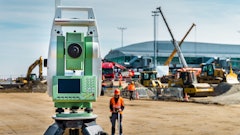
In an industry as large and complex as construction, simplifying processes can reap significant benefits for contractors in terms of productivity, mitigated project risks, and profitability. Managing construction projects is hard enough without the additional burden of wrangling reams of paperwork or trying to get multiple software programs to talk to each other.
That said, far too many contractors today are still conducting operations with outdated software and/or manual processes. Why? The biggest reasons boil down to familiarity and reliance on the existing systems that teams have been using and assumptions of the costs of a technology overhaul versus return on investment.
With the growing complexity of construction work and the ongoing impact of technology on our daily lives, contractors are facing greater pressure to deliver projects with greater intelligence and efficiency. Doing so in a high-risk, low-margin market increases the importance of data-driven decision-making for contractors looking to keep a competitive edge. The better the business intelligence, the larger the edge, and developing intelligence starts with a strong base of business performance data.
The construction projects of today generate enormous amounts of data. The task has been how to efficiently handle and examine the generated data. Making better use of project data has become critical as technologies like cloud computing, integrated software platforms, and mobile applications have started to change how contractors work.
Commercial Cloud-Based Software Adoption
Commercial software is the leading choice across various industries for efficient business process automation, commanding an impressive average satisfaction rate of 76%. Its performance notably surpasses traditional methods like paper forms, spreadsheets, and even custom-designed software across several critical metrics. From corporations to small retail shops, technology adoption has revolutionized how businesses are managed. This includes the timely delivery of data, unparalleled accuracy, detailed business insights, evolving usability, data integrations, and the capability for extensive data analysis. Furthermore, the regular maintenance, ongoing enhancements, and development of new features in commercial software solidify its position as the optimal solution for businesses seeking robust and reliable data management tools.
In construction, heavy highway and civil contractors have fully embraced commercial software with mobile apps to capture field data, with 82% of firms surveyed reporting using these applications. Meanwhile, 72% of specialty trade contractors also rely on these mobile applications. Contractors also increasingly use technologies like drones, cameras, sensors, and wearables on the jobsite. Almost all (94%) of the general contractors surveyed are using at least one of these devices, but nearly a quarter (23%) of trades are still not using any.
Benefits of Modern Construction Software
Once perceived as a graveyard for technological advancement opportunities, the construction industry is now wholeheartedly investing in modern technology. The current landscape is replete with novel solutions designed to enhance construction processes and simplify tasks, effectively achieving these goals. Notable recent advancements include:
- The shift to cloud-based software for operational management across various construction segments has greatly simplified access to, manipulation, and sharing of real-time data, enabling faster and more informed decision-making.
- The use of interactive dashboards, smart user interfaces, and comprehensive online portals for tasks like tracking construction progress has empowered professionals to independently address their specific needs and objectives.
- The integration of advanced mobile devices and user-friendly construction apps allows teams and leaders to manage tasks remotely and efficiently.
- The implementation of automated workflows, along with software that is customizable, scalable, and flexible, has eased the workload on end-users and allowed for tailoring to specific company requirements.
- Advanced business intelligence tools are providing deeper insights into project data, aiding in identifying areas for enhancement, achieving efficiency, and preemptively addressing risks.
- The development of integrated software solutions facilitates easier collaboration and information sharing by utilizing a unified data set for various functions such as accounting, project management, quality control, safety, and equipment management, leading to streamlined operations.
To describe the ongoing changes in the construction industry as merely a technological transformation would be an understatement. These advancements are just the beginning, hinting at an even more tech-driven future for the construction sector.
The return on investment from embracing large-scale technologies in the construction industry is poised to be substantial, impacting stakeholders ranging from small contractors to large developers and designers. The adoption of fabrication, advancement in factory-based technologies, and the on-site deployment of robotics are collectively reshaping the construction landscape. When these technologies are fully integrated and utilized, the industry can expect transformative gains in several key areas. We can expect a significant positive impact on the bottom line for businesses across the spectrum, from small contractors to large-scale developers and designers.
Make It Happen: Embracing Technological Advancement
The path forward for the construction industry is unequivocally marked by technological innovation. Embracing these advancements is not just a step toward progress; it's a strategic imperative for staying relevant and competitive in a rapidly evolving market. It promises enhanced efficiency, precision, and safety, paving the way for a future where construction is faster, more cost-effective, and adaptable to the changing needs of society. It is important for industry players, irrespective of the size of the business operations, to not just acknowledge this shift but actively participate in it. By adopting these technologies, the construction industry can unlock its full potential, ensuring sustainable growth and continued success in the years to come.
Make it happen – embrace technology and be a part of shaping the future of construction.



























